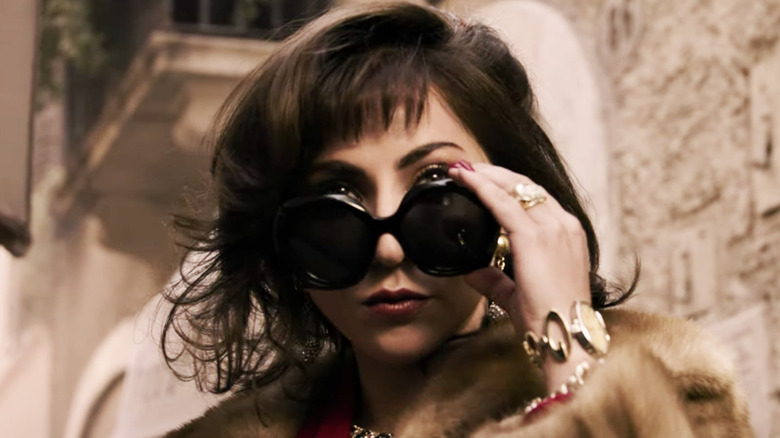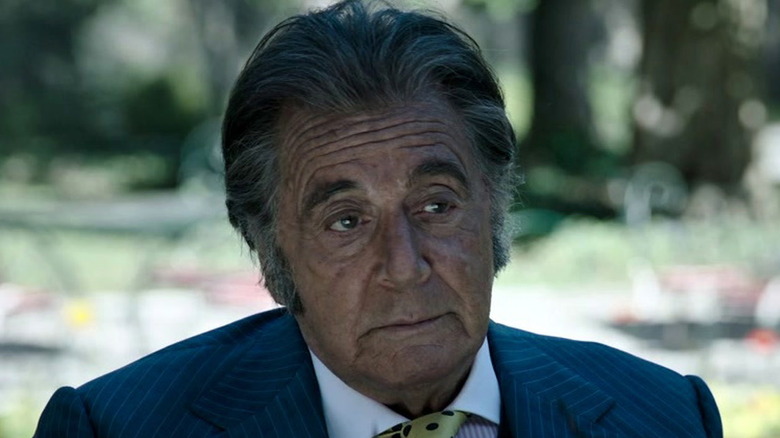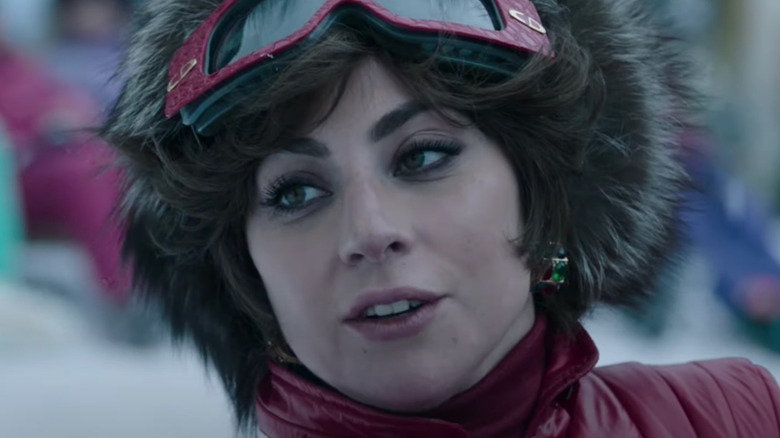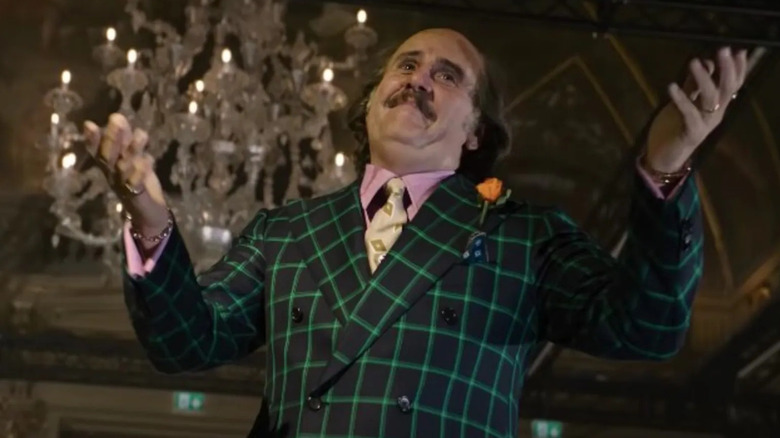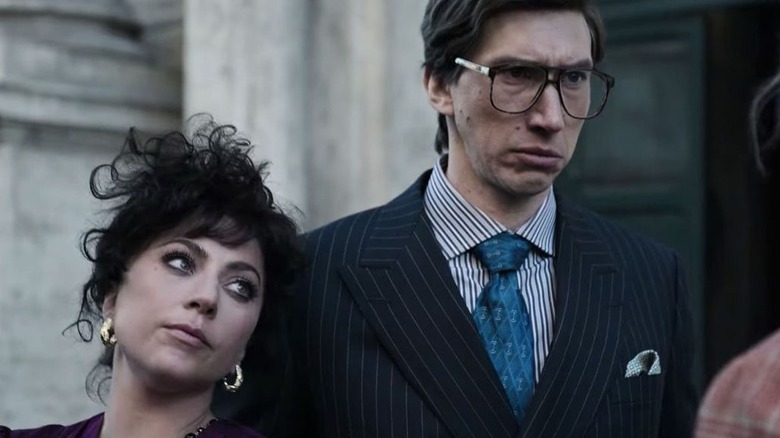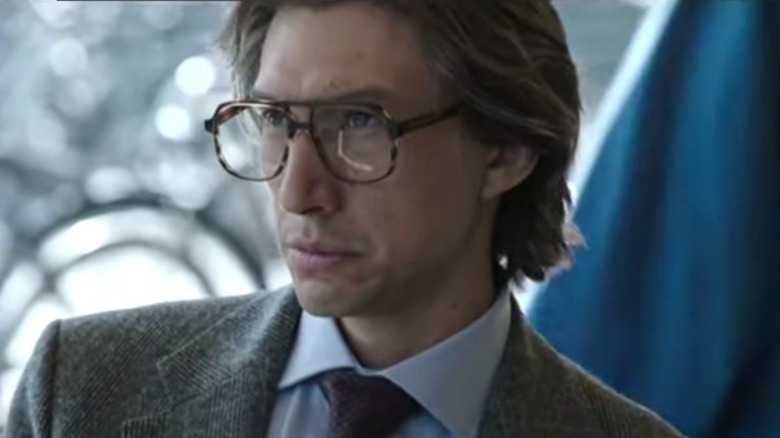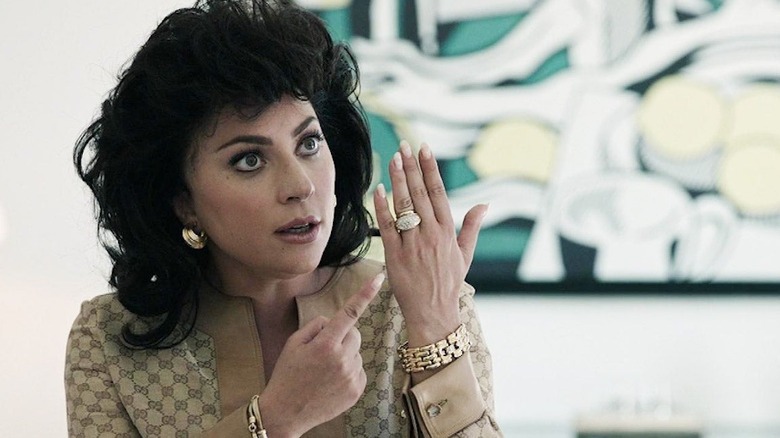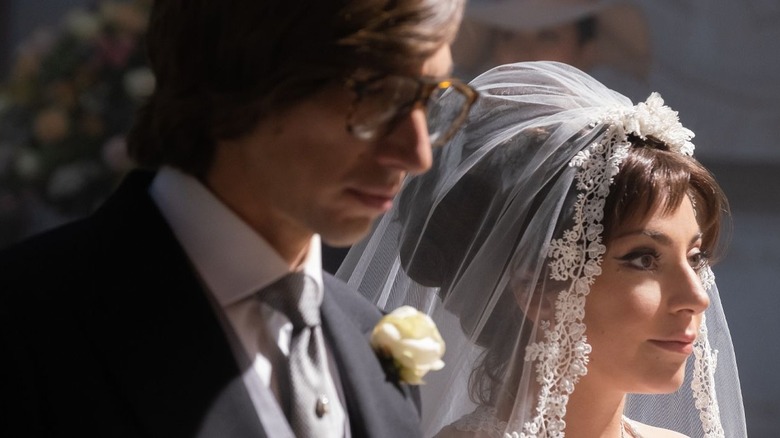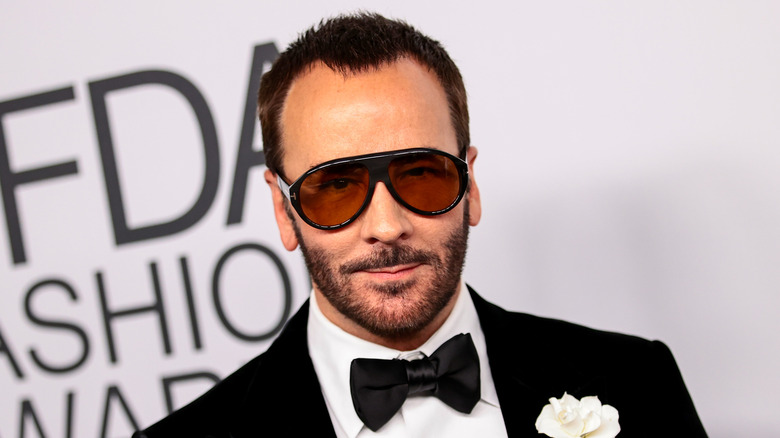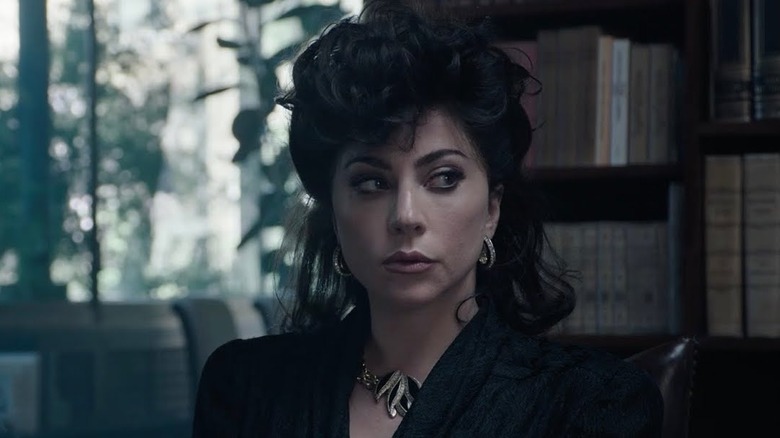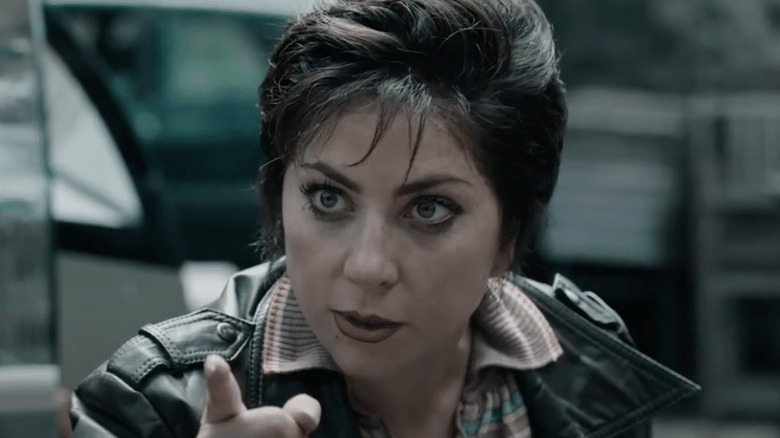What House Of Gucci Got Right And Wrong About The True Story
The history of the Gucci fashion company and the family behind it for so many decades is a long one, full of betrayal and scandal. At least, that is how the new Ridley Scott biopic "House of Gucci" depicts the woes that plagued the family in the '70s and '80s. The film stars Adam Driver as Maurizio Gucci, Lady Gaga as his wife Patrizia Reggiani, and Jared Leto, Al Pacino, and Jeremy Irons as other members of the legendary Italian family.
Despite living relatives of Maurizio and the other Guccis telling the AP (via The Guardian) that the casting was "horrible" and "ugly," Scott's film got a lot of the basics down pat. There are some finer details "House of Gucci" misses or dramatizes for effect, but most of the shocking events in the movie actually happened. Here's everything "House of Gucci" got right and wrong about the Gucci family's story.
Spoilers for "House of Gucci" follow.
Right: Gucci started the company while he was working as bellhop in London
Early in the movie, Maurizio's father Rodolfo (Jeremy Irons) gives Patrizia a run-down of the family history. Pretty much everything he says is accurate to real life. Rodolfo was indeed a very successful actor, mostly in Italian films from the 1940s and '50s. But one nugget of knowledge he lays upon her is that of how the company was started.
Irons gives an impassioned speech about his father Guccio and how he began the company while working as a bellhop in London. He would study the fabrics and fashion of the upper class who stayed there. This is true to life, as Guccio began his interest in fashion while working at the Savoy Hotel in 1987. However, it wouldn't be until after WWII that Gucci finally took his first job in fashion at Franzi, an Italian luggage manufacturer. He would work there until he started Gucci in 1921. The release of "House of Gucci" coincided with the 100 year anniversary of the company.
Wrong: The Reggianis were much richer than the movie made them out to be
In "House of Gucci", the class divide between the Guccis and Reggianis is a bit exaggerated. Yes, the Gucci family was extremely wealthy by the time Maurizio and Patrizia met, but the Reggiani's business was no slouch like the film implies.
Patrizia grew up poor, yes, but at age 12 her mother married Ferdinando Reggiani, a wealthy entrepreneur and businessman of the time. Per a Daily Beast profile, she grew up "among beautiful things" and had an extremely privileged life after that time. At one early scene in the movie, Maurizio takes Patrizia to a restaurant where she says "that's too expensive for me." Knowing her class situation, that would not have been true. Perhaps the filmmakers meant this to be her playing coy, but if so there isn't enough context given to Patrizia's backstory to fully communicate this with the audience. Having this context, viewers are more likely to sympathize with her less in moments like the one when Rodolfo accuses Patrizia of social climbing — which is based on a real quote, by the way, according to the 2000 biography that inspired the movie.
Right: Paolo ratted his father out for tax evasion
The movie makes Paolo Gucci (Jared Leto) out to be a complete loser — a man driven by greed and a lust for power that forced him to betray his own family. While the details of the family life are private, what is known publicly lines up with the way Leto portrayed Paolo in the movie. Notably, the younger Gucci did give information to the feds that led to his father's arrest.
As "House of Gucci" shows, a big source of family conflict in the 1980s was Paolo. In 1982 he began his tirade against his own brothers and father, as well as Maurizio. He charged his two brothers and Maurizio with assault that year. Not long after that he filed the lawsuit against the family and his father Aldo. By 1987, Paolo had won the fight to use the Gucci name on his products, but not without burning all the bridges with his family. As any viewer of the movie knows, the rest of his life was short and plagued with misfortune.
Wrong: Maurizio actually courted Patrizia, not the other way around
The one huge liberty that "House of Gucci" takes comes in the very beginning of the story. Our first impression of the young Gucci heir is that he is shy, not willing to flaunt his wealth. He is reluctant to even tell Patrizia that he is a Gucci. So it is Patrizia who is the more aggressive suitor, even following him to make a planned encounter look like a happy accident. She quite literally has to force him to ask her on a date. This is not how it happened. According to Patrizia (via The Guardian), she "didn't think much of him at first. He was just the quiet boy whose teeth crossed over at the front."
Maurizio was the one who threw himself unto her, she says in a Guardian profile. More than himself, he threw money at her, gracing her with expensive gifts to win her affection. This is quite the opposite of how the character is portrayed by Adam Driver in the first half of the film.
Right: Maurizio was truly that bad of a businessman
The main source of conflict in "House of Gucci" between the married couple stems from Patrizia's natural talent and Maurizio's complete lack of a business mind. While these details are often easily exaggerated for dramatic effect in biopics like this, it turns out Maurizio Gucci really was a bad businessman.
In the events of the film, Patrizia is allowed to be his trusted advisor until the death of his father. According to Reggiani this was indeed the turning point. "Until then I was his chief adviser about all Gucci matters. But he wanted to be the best, and he stopped listening to me," she told the Guardian. It was after this independence that Gucci began to struggle financially and indeed a lot of that failure fell on the shoulders of Maurizio. Like the movie shows, he eventually sold the entirety of the company to Investcorp in 1993 for a sum of $120 million. This made him a very rich man for the final year of his life.
Wrong: Patrizia was much more threatening during the divorce
The film does a good job showing viewers the dark side of both Maurizio Gucci and his wife. In a scene where Patrizia desperately grovels at his door to be with him, we see a cold Maurizio deny her advances and dismiss her as if she wasn't worthy of his time. His cheating, and the way he subsequently treated her during and after the divorce, was indeed cruel. But the movie left out a great deal of Patrizia's public threats and insults, many of which are detailed in a Forbes profile.
These verbal acts of resentment were clear during the divorce trial proceedings. A voice message Patrizia left for Maurizio called him "a deformed outgrowth, you are a painful appendix that all of us want to forget." She is on record saying for a time she did want to get rid of her husband (although she, of course, does not admit to the crime). It is well known she had premeditated the act, as she is said to have discussed it with her staff and lawyers.
Right: There was a doorman at the scene of Gucci's murder who got shot twice
The scene of Maurizio's murder is portrayed with vivid accuracy in "House of Gucci." It is exactly as Scott's vision made it look, with the hitman pulling up outside his office as he went inside. Like in the film, the gunman shot Gucci three times in the back and then approached his crippled body and shot him once more in the head at point blank range. And just like the events of that tragic day, "House of Gucci" shows a doorman get shot two times before closing the door and retreating into the building.
This man is actually the reason these details of the incident are public knowledge. Giuseppe Onorato, the doorman at Gucci's office on that fateful day, survived two shots in the arm. At first, he was in a state of shock. "I thought it was a joke," Onorato said to the Guardian. "Then the shooter saw me. He lifted the gun again and fired two more times. 'What a shame,' I thought. 'This is how I die.'"
Onorato survived, but the incident riddled him with persistent pain and lifelong anxiety.
Wrong: Gucci executive vice president Dawn Mello was the one who discovered Tom Ford
In "House of Gucci',' there is a scene where one of Maurizio's advisors introduces him to a young, hot designer from Texas. Although not referenced by name until later in the film, any expert on the subject matter can tell you this man is Tom Ford, played by Reeve Carney in the film. Ford, now one of the most famous fashion designers in the world, began his illustrious career at Gucci. But Maurizio was not the one to discover him.
A player in the Gucci affairs of the time period that the movie completely neglects to include is Dawn Mello. She was the executive vice president and chief designer at Gucci from 1989 until 1994. While Maurizio struggled to run a business, a lot of the success of Gucci at the time can be credited to Mello. The hiring of Tom Ford was her doing, according to her obituary in the New York Times, done in an attempt to revitalize the women's wear section of the Gucci brand. Mello brought Ford on board in 1990.
Right: Patrizia really did get caught by writing 'Paradeisos' in her diary
At the end of the film, we see Gaga acting her heart out in an emotional scene where Patrizia bittersweetly writes down "Paradeisos" in her diary. The Greek word for paradise, this single-word entry is shown briefly in the film, but in reality was written the day he was assassinated. The diary entry is an extremely real and famous talking point of the case and was even used as evidence in the trial against her.
According to a profile in Forbes, Reggiani has since stated this wasn't what the court interpreted it to be. She claims she had written down the word because she wanted to use it as the name for her next villa. The movie, smartly, allows for this ambiguity as well by never directly tying the hit to the diary entry. However, the film does explicitly take the side that Patrizia did commit the crime she was accused of by portraying the meeting. Some involved deny it ever happened that way.
Wrong: Patrizia never met with the hitmen
The scene where Pina and Patrizia get together to meet with the hitmen in a public space is a much disputed aspect of the story. All parties have a slightly different account of how it happened. Pina Auriemma, Patrizia's friend and spiritual guide, has publicly denied involvement to the extent that the movie portrays.
The two women involved have differing accounts of what happened the day the hit was called, according to Forbes. Auriemma says that she gave in during a "moment of weakness" to pressure from Gucci after being asked repeatedly to find a killer. Patrizia claims Auriemma found a killer on her own, and then blackmailed her into paying the fee. Neither of these accounts are accurate to what was depicted in "House of Gucci." Regardless of what actually happened, it is known that Patrizia was not present at the hiring of the killers — that would have been far too risky.
